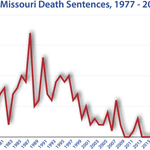
State & Federal
Missouri
History of the Death Penalty
The death penalty was first used in Missouri in 1810 when Peter Johnson was hanged for murder. Missouri carried out a total of 285 executions from 1810 to 1965. Hanging was the primary method of execution until 1936, when lethal gas came into use from 1937 until 1987. Starting in 1987, lethal injection was added as an option for inmates in addition to lethal gas.
Timeline
1937 — Roscoe “Red” Jackson is executed by hanging in the last public execution in the United States.
1989 — In Wilkins v. Missouri, the U.S. Supreme Court finds that capital punishment imposed on a person for a crime committed at 16 or 17 does not constitute cruel and unusual punishment under the 8th amendment. This decision was reached in consolidation with the case of Stanford v. Kentucky.
2001 — Missouri is the 16th state to ban the execution of prisoners with intellectual disabilities. This bill is not retroactive for those currently on death row.
2003 — Joseph Amrine is exonerated after spending 17 years on death row.
2005 — In Roper v. Simmons, the U.S. Supreme Court rules that the execution of those under the age of 18 at the time of their crime is unconstitutional.
2007 — The Missouri legislature defeats a bill that would have made the death penalty a mandatory sentence for those who murder law enforcement officers.
2011 — Governor Jay Nixon commutes the sentence of Richard Clay.
2012 — The Missouri Department of Corrections announces it is switching from a three-drug lethal injection protocol to a single-drug method involving Propofol. Missouri’s written protocol does not require a physician to be present on the execution team.
2012 — The United States’ main suppler of propofol announces it will not allow the drug to be sold for executions. Fresenius Kabi USA, a German-based company with offices in Illinois, will not accept orders for propofol from any departments of justice in the United States.
2014 — An investigation by St. Louis Public Radio and the St. Louis Beacon found that the source of Missouri’s lethal injection drug, pentobarbital, is a compounding pharmacy in Oklahoma that is not licensed to sell drugs in Missouri.
2015 — Missouri carries out the execution of Cecil Clayton, a brain-damaged man with an IQ of 71, without a hearing to determine his competency.
2016 — Cole County, Missouri Circuit Judge Jon Beetem rules that Missouri must release the names of pharmacies that provide drugs for lethal injection.
2018 — Missouri Judge Kelly Wayne Parker imposes the death penalty on Marvin Rice, disregarding the near-unanimous jury vote to spare his life. Four months later, Missouri Judge Thomas Mountjoy sentences Craig Wood to death after a non-unanimous jury vote.
2019 — In Bucklew v. Precythe, the U.S. Supreme Court holds that any challenges to the state’s method of execution on the basis of excessive pain must include alternative methods of execution that are less painful. The court affirm that the 8th Amendment does not guarantee a painless death and only punishments that “intensify the sentence of death” with a “superaddition of terror, pain, or disgrace” can be classified as cruel and unusual.
2023 — Missouri carries out the first known execution of an openly transgender woman, Amber McLaughlin.
Famous Cases
Roper v. Simmons (2005): Christopher Simmons was 17 years old when he and two other teenagers, broke into the home of Shirley Crook, kidnapped her, and pushed her off a bridge into the Meremac River. Simmons bragged about the murder to friends, and eventually confessed to police. He was convicted of the crime and sentenced to death. Simmons appealed the death sentence on the basis that he was only 17 years old at the time of the crime, and the execution of a juvenile was cruel and unusual punishment in violation of the Eighth Amendment. The Missouri Supreme Court ruled in favor of Simmons, overturning his death sentence and sentencing him to life in prison without parole. The State of Missouri appealed the case to the U.S. Supreme Court. The Court ruled that execution of individuals who were under 18 at the time of their crime was unconstitutional. In its decision, the Court noted a “national consensus” against the practice of executing juvenile offenders; just 20 states allowed the juvenile death penalty by statute, and only 3 had executed a juvenile offender in the last 10 years.
Notable Exonerations
Joseph Amrine was serving time for robbery and burglary in Missouri State Penitentiary when he was accused of stabbing fellow inmate Gary Barber, in 1986. No physical evidence linked Amrine to the crime, and he was convicted primarily based on tesimony from other inmates and was sentenced to death. Amrine appealed his death sentence and the Missouri Surpreme Court found “clear and convincing evidence of actual innocence.” Three inmates who had previously testified recanted their statements, saying they lied in exchange for protection. Six other inmates testified to seeing Amrine playing cards at the time of the murder. The court ordered that Amrine be released within 30 days unless he was charged with another crime. Missouri prosecutor Bill Tackett brought new murder charges on Amrine, but dropped the charges a month later after DNA tests conducted on blood stains from the crime were inconclusive. Amrine was freed in August 2003.
Notable Commutations/Clemencies
Darrell Mease was convicted and sentenced to death for the murder of his former drug partner, Lloyd Lawrence, Lawrence’s wife, and Lawrence’s grandson. He was scheduled to be executed in 1999. Pope John Paul II was visiting Missouri at the time and made a personal plea to Governor Carnahan to grant Mease mercy. The day before Mease’s execution, Governor Carnahan granted Mease clemency, commuting his sentence to life without parole.


Resources
- American Bar Association Missouri Death Penalty Assessment Report
- Department of Corrections
- Missourians for Alternatives to the Death Penalty
- Missouri Office of Prosecution Services
- Public defender’s office
- Victims’ services
- Missouri Death Row
- 2015 Annual Report from Missourians for Alternatives to the Death Penalty

Missouri Execution Totals Since 1976
News & Developments
News
Oct 08, 2025
Upcoming Executions Illustrate Persistent Themes and Concerns Around the Death Penalty
Beginning October 10th, and then over the next eight days, six people are scheduled to be executed by lethal injection in six different states. Already this year, there have been 34 executions in nine states. While the concentration of so many executions in such a short period will certainly attract attention, the number is not the headline. These cases highlight important issues that are true whenever and wherever there are executions. First, even at this late…
Read MoreNews
Aug 01, 2025
Exoneree Sandra Hemme’s Case Reflects Broader Pattern of Opposition to Innocence Claims from Missouri Attorney General’s Office
Sandra Hemme walked free from a Missouri prison in July 2024 after 43 years behind bars for a murder she did not commit; however, her release only came after a judge threatened state Attorney General Andrew Bailey with contempt of court for trying to keep Ms. Hemme incarcerated despite overwhelming evidence of her innocence. Now 65 years old, Ms. Hemme has filed a lawsuit against the city of St. Joseph, Missouri and eight police officers involved in her case for malicious…
Read MoreNews
Jun 04, 2025
2025 Roundup of Death Penalty Related Legislation
More than one hundred bills have been introduced this year in 34 states and in Congress to expand and limit use of the death penalty, abolish and reinstate the death penalty, modify execution protocols and secret the information about them, and alter aspects of capital trials. Thus far, nine bills in five states have been enacted, with Florida enacting the most legislation. Of the bills that have been signed into law, three modify execution protocols; two expand…
Read MoreNews
Apr 15, 2025
United States Supreme Court Denies Review for Death-Sentenced Missouri Man Whose Jury Foreman Was Removed for Bias
On March 31, the Supreme Court declined to hear the appeal of Lance Shockley of Missouri, the 36th death-sentenced person to be denied certiorari by the Court this year. At trial, Mr. Shockley’s jury foreman was removed before the sentencing phase based on evidence of serious bias — but Mr. Shockley’s attorney declined the opportunity to question the foreman or other jurors about the misconduct, and his conviction, which the foreman participated in, was allowed to…
Read MoreNews
Dec 05, 2024
Hidden Casualties: Executions Harm Mental Health of Prison Staff
In March, Oklahoma officials asked the state’s high court to increase the time between executions from 60 to 90 days, citing the“lasting trauma” and“psychological toll” of executions on corrections officers. But Judge Gary Lumpkin dismissed these concerns, telling officials that prison staff needed to“suck it up” and“man up.” A few weeks later, Brian Dorsey was executed in Missouri after the governor ignored the pleas of an unprecedented 72 corrections…
Read More

